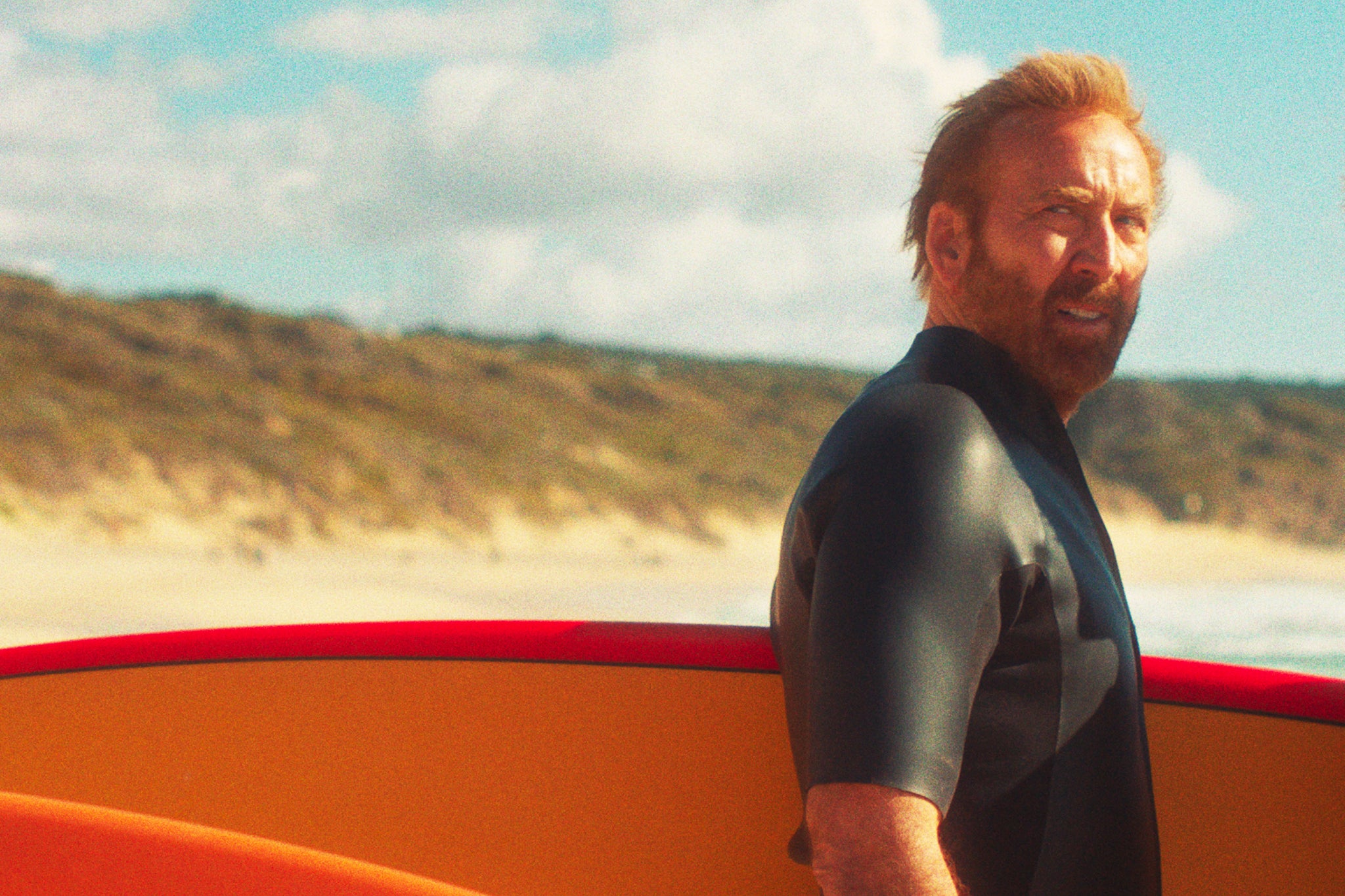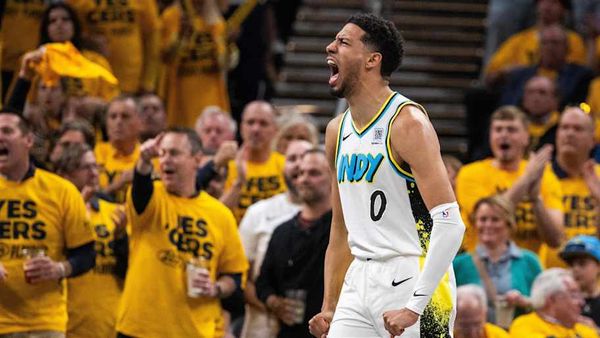The Surfer is a wild, rocky, beach-bound B-movie that pits a hapless, frazzled loner against a band of local bullies. The loner wants to ride the big waves and make a new home on the coast, but he’s been confined to the car park and is slowly losing his mind. “Before you surf you must suffer,” he is told by the bullies, just at the point when his holiday goes to hell. Soon he’s drinking out of puddles and eating out of bins. He’s bitten by a rat and crapped on by a parrot. The man’s both a joke and a danger, a victim and a hero. Is it irrelevant to mention that he’s played by Nicolas Cage?
Conceivably there are other actors who could have starred in The Surfer, Lorcan Finnegan’s wonderfully punch-drunk new thriller, and these might have fit more neatly with the tale. The Surfer is set in Western Australia and the hero himself is a local boy. This means that the script has to perform several ungainly pivots in order to justify Cage’s presence. “I thought you were American,” remarks a passing photographer, which provides the cue for the actor to explain that he has actually spent years in California and now wants to move back to his old family home on the cliff. Cage, like Connery and Schwarzenegger, rarely bothers with accents and tends to burst out of each role like the Incredible Hulk in a wetsuit. No script can restrain him; he has to be who he is. The Surfer accepts this and makes the necessary adjustments. The hero, it turns out, is never even named. He’s Nicolas Cage with a surfboard: this is the film’s USP.
It’s a paradox of movie stardom that the more recognised and successful an actor becomes, the more they are encouraged to play a version of themselves and the less actual acting they are required to do. Cage, for the record, is at pains to insist that he has little in common with his crazed and colourful alter-ego. He says he likes to read Russian literature, watch films by Bergman and Tarkovsky and enjoys nothing better than a quiet night on the couch. All of which may well be true. Except that Steve Coogan once said that every movie star he’s known is basically an 80 per cent version of their onscreen image, and it is therefore possible that Cage’s freestyle histrionics are at least tangentially related to the man who famously squandered his fortune on castles and cars and a dinosaur skull, and who once embarked on an as-yet-unresolved quest to locate the Holy Grail. In The Unbearable Weight of Massive Talent (2022) he even played a wayward, broke actor called Nicolas Cage.
I interviewed him once, years ago, and mentioned Sean Penn’s criticism that he was “no longer an actor [and] more like a performer”. At the time, Cage was so hurt and offended by the comment (and, more specifically, by my bringing it up) that he promptly complained to his publicist. Since then he’s embraced the description; even weaponised it. Performing, he says now, is more inherently honest than acting. It’s more emotional, more centred – and crucially, more self-directed.
It’s what allows him to wrest control of a script and produce his own body of work, taking the role of both artist and clay, in the same way that John Wayne and Clint Eastwood sculpted themselves as emblems of American masculinity, or Marilyn Monroe and Cary Grant came to embody ideals of 20th-century glamour. And if every movie star is 80 per cent their creation, then that last 20 per cent is where the magic and mystery resides. Grant, let’s not forget, was once humble Archibald Leach from the back streets of Bristol. His career was a triumph of self-actualisation, so graceful and perfect that it confused even him. “I have spent the greater part of my life fluctuating between Archie Leach and Cary Grant,” he would later remark. “Unsure of either, suspecting each.” He was superb in Notorious, Charade and The Philadelphia Story. But his great, enduring masterpiece was the role of Cary Grant.
Out by the beach, our desperate would-be surfer is coming apart at the seams. He’s tangling with the locals and has gone hoarse from shouting. He’s a danger to himself and to everyone in his vicinity. This is Cage’s stock in trade, honed and perfected in everything from Raising Arizona and Wild at Heart through Joe, Mandy, Pig and Bad Lieutenant. The man specialises in tragicomic storms and potent displays of impotence. He’s certainly not Cary Grant, or Eastwood, or Wayne, because his characters lack authority and are more about bluster than strength. If they’re emblems of anything, it’s of chaos and disarray.
But Cage knows what he’s doing, even when his alter-ego does not. Film acting, he has said, is a little like painting. Most people prefer their pictures to be representational and naturalistic. But there is still room for the occasional mad abstract canvas, with the colours all clashing and everything out of proportion. That’s what Cage gives us: surreal portraiture; a funhouse mirror reflection of himself. This might not count as great acting per se, but as a performance it’s tremendous.

Cage reaches for a lofty artistic metaphor to describe his way of working. The Surfer, though, provides another. The bullies on the beach are the immovable object. The man with his board is the irresistible force. “You can’t stop a wave, it’s pure energy,” Cage explains during the film’s opening scene, in what basically amounts to a mission statement, or a hazard warning. He’s about to hit the screen with an almighty crash, bending the very film to his will. Weak directors buckle and risk going under. Strong directors are able to ride the swell. Cage is a fabulous performer. He's remorseless and elemental; almost always impressive, almost always the same.
‘The Surfer’ is in cinemas from 9 May







